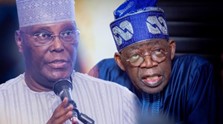Alhaji Atiku Abubakar, the Peoples Democratic Party (PDP) presidential candidate in the last general election, has responded to accusations from the Presidency, dismissing claims that his consistent criticism of President Bola Ahmed Tinubu’s administration is driven by envy.
In a statement issued by his Special Assistant on Public Communication, Mr. Phrank Shuaibu, on Monday in Abuja, Atiku argued that his critique is justified given the economic and governance issues affecting Nigerians.
Atiku Abubakar, who lost the presidential race to Tinubu by a significant margin, highlighted several issues with the current administration’s policies. One key point raised was the delay in implementing Tinubu’s July 2024 announcement to lift import duties on essential goods, including food, for a period of 150 days. Atiku noted that more than 120 days have passed since the announcement, yet the policy has not been put into effect.
“Nigerians continue to suffer from soaring food prices, with food inflation now exceeding 40%, the highest rate seen in decades,” Atiku stated. He criticized the Finance Ministry for failing to issue the necessary gazette to activate the policy, labelling the delay as a sign of “incompetence” within Tinubu’s administration.
Atiku further lambasted Tinubu for what he described as a lack of preparedness for the presidency. He pointed to the abrupt removal of the petrol subsidy without adequate mitigating measures as evidence of Tinubu’s hasty decision-making. “Tinubu’s decision to remove the petrol subsidy was made without considering the consequences, leading to a sudden increase in transportation and food costs,” Atiku remarked.
He criticized the subsequent push for a Compressed Natural Gas (CNG) initiative as a reactive measure, arguing that the initiative has failed to gain traction due to insufficient gas infrastructure in many states. “Even Tinubu and his ministers have not adopted the CNG initiative, showing their lack of confidence in the policy,” he added.
The PDP former presidential candidate also expressed concerns over the state of the economy, citing the exchange rate projections in Tinubu’s mid-term expenditure framework.
According to Atiku, the projected exchange rates of N700/$1 in 2024 and N650/$1 in 2025 reveal the administration’s grim outlook on the naira’s value. He emphasized that these projections highlight the economic challenges under Tinubu’s leadership, particularly as the naira continues to depreciate against major foreign currencies, exacerbating inflation and the cost of living for ordinary Nigerians.
Atiku did not limit his criticisms to economic policies alone but also raised security concerns, specifically referencing the emergence of a new terror organization in the Northwest. He mentioned a group called “Lakurawa,” which has reportedly increased its activities in the region, posing a growing threat to national security. The rise of this group, Atiku argued, is a testament to the government’s failure to address the worsening insecurity in Nigeria.
“The emergence of new terror organizations like Lakurawa signals a deteriorating security situation in the country,” he noted. He added that the frequent collapse of the national electricity grid, particularly in the North, is partly due to the destructive activities of bandits, further disrupting the already fragile power supply.
Atiku accused the Tinubu administration of neglecting critical governance issues in favor of attacking its political opponents. He alleged that rather than focusing on policy implementation and national development, the government has been preoccupied with undermining opposition figures, including himself and Peter Obi.
“Instead of addressing the country’s pressing challenges, Tinubu’s administration is more interested in verbal assaults against the opposition and using compromised courts to create crises,” Atiku asserted. He described this approach as “a disservice to the Nigerian people,” calling it a distraction from the pressing issues that require immediate government intervention.
Moreover, Atiku criticized the government’s handling of the exchange rate and inflation, arguing that policy missteps have contributed to the continued rise in living costs. He pointed out that Tinubu’s administration projected an unrealistic exchange rate, showing a disconnect between government projections and the reality faced by ordinary Nigerians. The increasing gap between official projections and actual market rates, he said, is evidence of a deeper economic malaise that the government has failed to address effectively.
Atiku Abubakar reiterated that his criticisms stem not from envy but from a genuine concern for the state of the nation. He argued that the economic and security challenges facing Nigeria require competent leadership, which he believes Tinubu’s administration has failed to provide.
Atiku called on the government to prioritize addressing the country’s pressing issues rather than focusing on political rivalries. He urged the administration to implement its policies effectively and work towards alleviating the hardships faced by ordinary Nigerians, particularly in the areas of food security, economic stability, and national security.



































